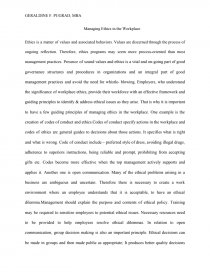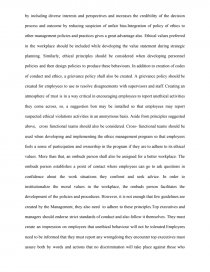Managing Ethics in the Workplace
Essay by Geraldine Pugrad • May 11, 2019 • Essay • 1,635 Words (7 Pages) • 1,456 Views
GERALDINE F. PUGRAD, MBA
Managing Ethics in the Workplace
Ethics is a matter of values and associated behaviors. Values are discerned through the process of ongoing reflection. Therefore, ethics programs may seem more process-oriented than most management practices. Presence of sound values and ethics is a vital and on-going part of good governance structures and procedures in organizations and an integral part of good management practices and avoid the need for whistle- blowing. Employers, who understand the significance of workplace ethics, provide their workforce with an effective framework and guiding principles to identify & address ethical issues as they arise. That is why it is important to have a few guiding principles of managing ethics in the workplace. One example is the creation of codes of conduct and ethics.Codes of conduct specify actions in the workplace and codes of ethics arc general guides to decisions about those actions. It specifies what is right and what is wrong. Code of conduct include – preferred style of dress, avoiding illegal drugs, adherence to superiors instructions, being reliable and prompt, prohibiting from accepting gifts etc. Codes become more effective when the top management actively supports and applies it. Another one is open communication. Many of the ethical problems arising in a business are ambiguous and uncertain. Therefore there is necessary to create a work environment where an employee understands that it is acceptable, to have an ethical dilemma.Management should explain the purpose and contents of ethical policy. Training may be required to sensitize employees to potential ethical issues. Necessary resources need to be provided to help employees resolve ethical dilemmas. In relation to open communication, group decision making is also an important principle. Ethical decisions can be made in groups and then made public as appropriate; It produces better quality decisions by including diverse interests and perspectives and increases the credibility of the decision process and outcome by reducing suspicion of unfair bias.Integration of policy of ethics to other management policies and practices gives a great advantage also. Ethical values preferred in the workplace should be included while developing the value statement during strategic planning. Similarly, ethical principles should be considered when developing personnel policies and then design policies to produce these behaviours. In addition to creation of codes of conduct and ethics, a grievance policy shall also be created. A grievance policy should be created for employees to use to resolve disagreements with supervisors and staff. Creating an atmosphere of trust is in a way critical in encouraging employees to report unethical activities they come across, so, a suggestion bon may be installed so that employees may report suspected ethical violations activities in an anonymous basis. Aside from principles suggested above, cross functional teams should also be considered. Cross- functional teams should be used when developing and implementing the ethics management program so that employees feels a sense of participation and ownership in the program if they are to adhere to its ethical values. More than that, an ombuds person shall also be assigned for a better workplace. The ombuds person establishes a point of contact where employees can go to ask questions in confidence about the work situations they confront and seek advice. In order to institutionalize the moral values in the workplace, the ombuds person facilitates the development of the policies and procedures. However, it is not enough that few guidelines are created by the Management, they also need to adhere to these principles.Top executives and managers should endorse strict standards of conduct and also follow it themselves. They must create an impression on employees that unethical behaviour will not be tolerated.Employees need to be informed that they must report any wrongdoing they encounter top executives must assure both by words and actions that no discrimination will take place against those who report ethical breaches. At last, updating policies and procedures must also take place. Policies and procedures concerning ethics at the workplace should be reviewed and updated on a regular basis, to produce behaviours preferred from the code of conduct, job descriptions, performance appraisal forms, management- by- objectives expectations, standard firms, checklist, budget report formats, and other relevant control instruments to ensure conformance to the code of conduct.
With these, business ethics has also benefits that can benefit both the company, employees and the public. Attention to business ethics has substantially improved society. Also, Ethics programs help maintain a moral course in turbulent times. Attention to business ethics is critical during times of fundamental change — times much like those faced now by businesses, both nonprofit or for-profit. During times of change, there is often no clear moral compass to guide leaders through complex conflicts about what is right or wrong. Continuing attention to ethics in the workplace sensitizes leaders and staff to how they want to act — consistently.Ethics programs cultivate strong teamwork and productivity. Ethics programs align employee behaviors with those top priority ethical values preferred by leaders of the organization. Usually, an organization finds surprising disparity between its preferred values and the values actually reflected by behaviors in the workplace. Ongoing attention and dialogue regarding values in the workplace builds openness, integrity and community — critical ingredients of strong teams in the workplace. Employees feel strong alignment between their values and those of the organization. They react with strong motivation and performance. Ethics programs support employee growth and meaning. Attention to ethics in the workplace helps employees face reality, both good and bad — in the organization and themselves. Employees feel full confidence they can admit and deal with whatever comes their way. Ethics programs are an insurance policy — they help ensure that policies are legal. There is an increasing number of lawsuits in regard to personnel matters and to effects of an organization’s services or products on stakeholders. As mentioned earlier, ethical principles are often state-of-the-art legal matters. These principles are often applied to current, major ethical issues to become legislation. Attention to ethics ensures highly ethical policies and procedures in the workplace. It’s far better to incur the cost of mechanisms to ensure ethical practices now than to incur costs of litigation later. A major intent of well-designed personnel policies is to ensure ethical treatment of employees, e.g., in matters of hiring, evaluating, disciplining, firing, etc. Note that “an employer can be subject to suit for breach of contract for failure to comply with any promise it made, so the gap between stated corporate culture and actual practice has significant legal, as well as ethical implications.” Ethics programs help avoid criminal acts “of omission” and can lower fines. Ethics programs tend to detect ethical issues and violations early on so they can be reported or addressed. In some cases, when an organization is aware of an actual or potential violation and does not report it to the appropriate authorities, this can be considered a criminal act, e.g., in business dealings with certain government agencies. However, the guidelines potentially lowers fines if an organization has clearly made an effort to operate ethically.Ethics programs help manage values associated with quality management, strategic planning and diversity management — this benefit needs far more attention. Ethics programs identify preferred values and ensuring organizational behaviors are aligned with those values. This effort includes recording the values, developing policies and procedures to align behaviors with preferred values, and then training all personnel about the policies and procedures. This overall effort is very useful for several other programs in the workplace that require behaviors to be aligned with values, including quality management, strategic planning and diversity management. Ethics management programs are also useful in managing diversity. Diversity is much more than the color of people’s skin — it’s acknowledging different values and perspectives. Diversity programs require recognizing and applying diverse values and perspectives — these activities are the basis of a sound ethics management program. Ethics programs promote a strong public image. Attention to ethics is also strong public relations — admittedly, managing ethics should not be done primarily for reasons of public relations. But, frankly, the fact that an organization regularly gives attention to its ethics can portray a strong positive to the public. People see those organizations as valuing people more than profit, as striving to operate with the utmost of integrity and honor. Aligning behavior with values is critical to effective marketing and public relations programs. Last – and most — formal attention to ethics in the workplace is the right thing to do.
...
...





